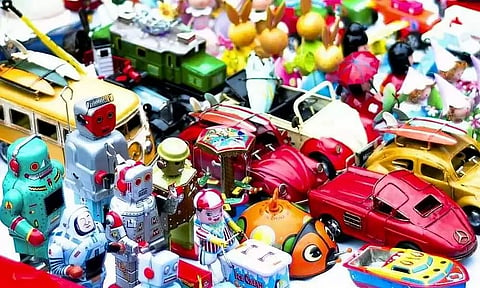
- Home
- Live Blog
- Breaking News
- Top Headlines
- Cities
- NE News
- Sentinel Media
- Sports
- Education
- Jobs

New Delhi: The government may put curbs
on imports of toys, particularly cheaper ones with poor quality, by moving it
from free to restricted list, as it looks to develop a strong and dynamic
domestic industry for such products having potential to compete in the global
market with countries such as China.
The Ministry of Commerce has identified toys among several categories of non-essential imports, where restrictions could be considered. In recent months, the commerce department has resorted to the use of import restrictions instead of free imports to boost domestic manufacturing.
Four to five areas, including leather and footwear, AC, furniture, tyre and toys have been zeroed in for wide scale import substitution where necessary push will also be given to scale up local manufacturing.
Government sources privy to the development said that new quality standards are also being finalised for the toy sector that would restrict import of items that fail the test and are considered health hazards, particularly for children. The standards would also apply to the domestic industry so that products developed here get acceptance in world markets.
Right now each consignment of imported toys has to be mandatorily tested in NABL accredited labs to see if they conform to the specified quality and health standards. The new standards could be developed for various categories of toys and its composition to see that sub-standard products do not reach Indian shores.
Under Prime Minister Narendra Modi's 'Aatmanirbhar Bharat' campaign, the plan is to develop toy manufacturing hubs with necessary R&D infrastructure and branding support to develop made in India products that are cost competitive and of high quality and can get international recognition.
Toy imports in various forms stands close to $1.5 billion though the official numbers are a tad lower. India imports over 85 per cent of its requirement of toys. Almost 85 per cent of total imports are from China which has captured a vast market in the country, and has completely shaken the domestic industry. Several imported toys from China have questionable quality which the government now wants to target to check dumping of toys.
"The high import component of battery operated and electronic toys is because the domestic industry does not offer the same variety due to lower scale and lower R&D capabilities. There is also the lack of cluster development approach for MSMEs manufacturing toys. This needs to change under the new Made in India initiative," said an official source.
The government has already put restrictions on toy imports when in December last year it increased import duty by 200 per cent to 60 per cent from the earlier 20 per cent level. This attracted a lot of adverse reaction from traders who felt they would be wiped from the market.
But the higher import duty has not affected Chinese imports as China is eligible for concessional duty as a signatory of the Asia-Pacific Trade Agreement (APTA). The APTA, a preferential trade agreement between five countries -- India, China, Korea, Laos and Sri Lanka -- provide s concessional duty on over 1,000 tariff lines, including toys, to encourage trade among the member countries.
The new quality standards may act as non tariff barrier that would check unrestricted imports while the government would incentivise both domestic and global players to set up manufacturing facilities in the country so that India could become a part of the $100 billion toy market globally.
The global toy industry is witnessing significant movement at the moment. Hasbro, a US multinational, which is among the top three toy companies in the world, has announced plans to shift 40 per cent of its order book from China by the end of 2020.
Even smaller Chinese companies, such as Pals Plush, have realised the advantage of producing in India and have begun to move operations here. With proper infrastructure for investment, the government thinks, India could be the next hub for toy manufacturing. (IANS)
Also watch: Evening Bulletin | 16th June, 2020